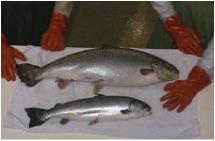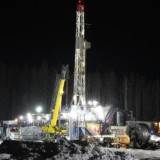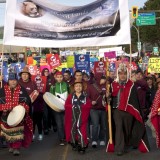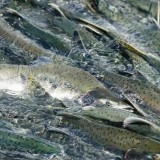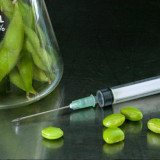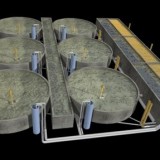The mystery of BC’s disappearing wild salmon is back on the radar this week, with the release of a new documentary on the subject and the launch of a groundbreaking research partnership to study farmed and wild fish for viruses that may be affecting both.
Salmon Confidential, a feature-length film released online last week, explores the battle over salmon science that was at the centre of last year’s federal judicial inquiry into rapidly declining Fraser River sockeye stocks, referred to as the Cohen Commission. Filmmaker Twyla Roscovich tracks the extraordinary efforts by several federal and provincial government agencies to muzzle leading scientists hot on the trail of exotic viruses – foremost among these the Department of Fisheries and Oceans’ own Dr. Kristi Miller.
The film is already generating some buzz, garnering over eleven thousand online views in under a week.
Also central to the film’s narrative are the Quixotic efforts of an unlikely team of scientists operating outside the government’s control – people like independent salmon biologist Alexandra Morton, SFU’s Dr. Rick Routledge, and two world-renowned virus experts in Atlantic Canada and Norway analyzing the samples of farmed and wild fish collected by Morton’s largely volunteer team. While they maintain, along with DFO’s Miller – who operates a state-of-the-art genomics lab out of Nanaimo’s Pacific Biological Station – that the deadly diseases like Infectious Salmon Anemia virus they’re finding offer a plausible answer to the mystery of BC’s disappearing salmon, government representatives have gone out of their way to attack the credibility of these scientists and labs and undermine their findings.
The narrative these researchers presented to the public was initially drowned out by highly sophisticated, effective media relations counterattack led by representatives of DFO and the Canadian Food Inspection Agency. But the latest chapter in this salmon virus saga may well tell a different story, as a newly announced government-backed research initiative, led in part by Dr. Miller, suggests (more on that below).
Watch Salmon Confidential for yourself here:
The Kristi Miller we see in Salmon Confidential has been muzzled by her government minders, prevented from speaking openly to media about her leading-edge use of genomic profiling to assess fish health and diseases. Only through official subpoena by a judicial inquiry is she able to suggest that these viruses may well be the “smoking gun” in the collapse of BC’s wild salmon. But there is evidence today that the intense public and media pressure that grew in reaction to Miller’s muzzling has had an effect on the Harper Government.
This week, a new scientific partnership to study salmon diseases was announced between Miller’s DFO lab, a government-supported research cluster called Genome BC, and the non-profit Pacific Salmon Foundation. According to a media release touting the new venture, “The project will conduct epidemiological assessments to explore the transmission dynamics and historical presence of detected microbes, with key focus on microbes that are suspected globally to be causing disease in salmon. Researchers will apply genomic technology to identify and verify which microbes are presently carried by BC’s wild and cultured fish.”
The project will span 4 phases over 5 years, with the first phase, valued at $930,000, already underway and set to conclude mid-2013. Phase 1, which involves collecting samples of farmed and wild fish for testing, is being co-directed by the PSF’s Dr. Brian Riddell and DFO’s Dr. Miller. The initiative grew out of the final recommendations of the Cohen Commission, which focused heavily on the impacts of open net pen salmon farms and the diseases they incubate on wild salmon. “The research conducted by the Pacific Salmon Foundation and Fisheries and Oceans Canada, and funded in part by Genome BC, will address specific recommendations from the Cohen Commission report and build on the body of research referenced by the Commission,” the media release noted.
According to Riddell, president of the Pacific Salmon Foundation, “This project is about developing effective monitoring tools to assess the microbes in BC’s salmon, assessing the risk of these microbes to Pacific salmon, and establishing public confidence that people are watching over the health of our wild salmon populations.” As Riddell told The Globe and Mail this week, “This is going to be the first really large-scale effort to look at the health of all salmon…It’s incredibly exciting.”
Also of note is Miller’s new-found freedom to speak publicly about her work. In her first interview in several years, she explained to The Globe’s Mark Hume the comparative advantage of her lab over less up-to-date techniques for tracking these elusive viruses. “There is … technology that I have been developing for the past year … that has the capacity to run about 45 microbes across 96 individual [fish samples] at a time, so one can quite rapidly generate a lot of information from a platform,” Miller said. “And that’s our goal at the moment – to assess 45 microbes that are known or suspected to cause disease in salmon worldwide.”
With significant resources at their disposal, Miller’s leading-edge lab and methods, and the credibility of a multi-stakeholder effort involving government, non-profits and the scientific community, this venture may hold the key to unlocking the mystery of BC’s disappearing salmon, once and for all.




